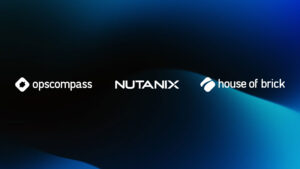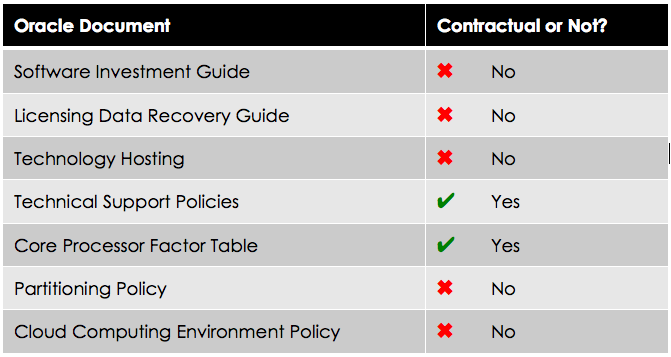Nathan Biggs (@nathanbiggs), CEO
I have been meeting with customers all around the world recently and talking commiserating with them about their experiences dealing with Oracle on licensing topics. I cannot think of a single company out there that has as negative a reputation with their valued customers than Oracle does. The customers I have been talking to say things like “I feel like they are bullying me” or “the Oracle reps keep telling me they are doing me a favor, but I still feel like I am being taken advantage of.”
These customers genuinely love Oracle technology (or most of it), but the frustration surrounding the sales tactics is definitely wearing them out. The House of Brick presentation that I have been giving on Oracle licensing on VMware infrastructure resonates strongly with the attendees of our sessions. They are unanimously appreciative of the talking points as they feel empowered to engage with their Oracle reps on licensing discussions.
So, rather than be intimidated by Oracle, let me help you develop your ninja skills. Here are the most important topics you should be comfortable with.
Oracle will spread 3 myths about running on vmware
Whenever I ask a prospective customer why they have not deployed Oracle on VMware, I get the same three excuses:
- Oracle does not support VMware
- Oracle does not perform well on VMware
- Licensing Oracle on VMware will be too expensive
When I ask people where they got that information from, they say “well, from my license rep.” Hmmm. That’s like the three little pigs asking the big bad wolf for construction advice. They are not true. Here is the truth about those three myths.
- Oracle does support VMware! Look up the MOS number 249212.1. That is the Oracle support statement for VMware. It states that all Oracle technologies are supported on VMware. It also says that it is not certified (hint, Oracle only typically certifies down to the OS level, and not below. You will not find Cisco, HP, or Dell listed on their certification matrix either). Since VMware lives below the OS, that is not inconsistent. People think OVM is an exception to that rule, but if you look at the installation guide for OVM, you are putting it on top of an existing OS. The support statement also says they will ask you to reproduce the problem on another platform if it is a bug that they have not seen before. Don’t be intimidated by that either. The same requirement is in place for running on physical. If they cannot reproduce your Cisco UCS or HP problem, they will ask you to show it to them on another platform. For VMware customers, VMware will step in and help with that problem if you get that far (we never have).
- Oracle runs great on VMware! Oracle performance is absolutely terrific on VMware. Occasionally we get some customers who have put Oracle on VMware themselves with less than acceptable results. There is a temptation to blame the virtualization layer for this problem, but that is not the case. Look through these blog posts, or bring us in to help you analyze and tune your performance. You will be happy you did.
- VMware can reduce your Oracle licensing footprint! Why else do you think Oracle fights so hard to get you to think you should not virtualize? VMware done right reduces licensing and Oracle does not want that. This leads to the next category of Ninja skills that you need to develop.
Not everything the Oracle rep tells you about licensing is true
This information has been well documented in this blog before, but it bears repeating. The license reps will tell you a lot of things that “just ain’t so.” First, I have a homework assignment for you. Go find your OLSA, open it up, and find the clause that tells you what you have to actually pay for. It says that you have to pay for every place that Oracle is “installed and/or running.” That’s it. So if it isn’t (installed and or running) don’t pay for it. We do not advocate cheating Oracle. You need to pay them everything you owe them, just not one penny more. As Dave Welch says, anything else is a donation. So for your hand-to-hand combat, here is your useful ninja guide to what you might hear, and what is true.
| What You Might Hear | What Is True |
| You cannot use soft partitioning to license a sub-number of cores in your server | Soft partitioning is not included in any of your contract documents. Remember, you have to pay where it is installed and/or running. We do not recommend VMware at this time for soft partitioning, however. When we lab tested it, VMware could not reliably ensure that the Oracle workloads stayed only on licensed cores. Hopefully VMware engineering will fix that soon. |
| You cannot use soft partitioning in a cluster | Huh? What is that? I think it might be the rep confusing the server soft partitioning concept with licensing in a cluster concept. There is no such restriction in your agreement. |
| If you put Oracle in a VMware cluster you have to license the whole cluster | You only have to license the nodes where Oracle is or has run (i.e., via vMotion). If you put adequate protections around the Oracle nodes in the cluster using Host Affinity Rules or some other method, then there is no reason to license the other nodes. It is not in your license agreement so don’t do it. |
| With vSphere 5.1, you have to license every node attached to the same storage array | Same answer as above. If it is not running there, then do not pay for the license. Your agreement defines what you have to pay for, not what the rep says. |
| With vSphere 6, you have to license every node in the whole enterprise | What?!? This is getting ridiculous… Just because you could potentially run or install Oracle on a node in the future does not mean you have to pay for it now. That is like saying you could go buy another blade from Cisco, so you have to license that now. See the Oracle Parking Garage comic below for how absurd we think this is. |
| The 10-day rule is vacated with VMware | Just say this…”Show me in my agreement where it says that.” They can’t. |
Some documents are binding and some are not
This leads to the final ninja skill you need to master. Know which Oracle documents are part of your agreement and binding on you and your company, and which are not. Here is a handy reference guide for you.
As Dave Welch expertly described in his recent webinar, Straight Talk on Oracle on VMware Licensing, your license agreement precludes other extraneous documents from being included in the agreement. Those non-contractual documents listed above indicate that as well. At the bottom of the page it says that this document is for educational purposes only and may not be included as part of your agreement.
So, there you go. You are now fully equipped ninjas ready to have difficult conversations with Oracle. If you need some help, we are here for you. House of Brick can help with architectures that minimize your Oracle license footprint, perform Oracle license review services, and even help support you in the case of an Oracle audit.
Please leave a comment below if you would like to share your own ninja stories.








